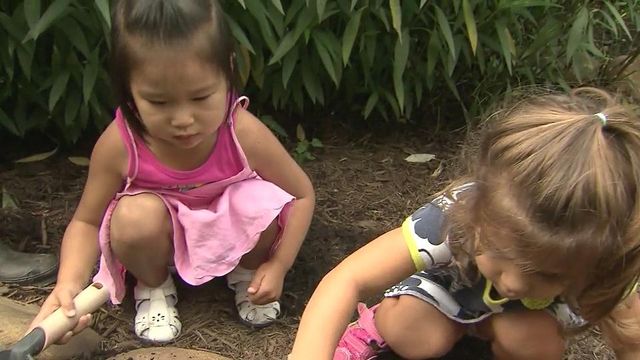Garden grows lessons in good health for youngsters
For most kids, recess is a chance to play on the monkey bars or hop on the merry-go-round. But for the young students at First Environments Early Learning Center, recess means digging in the dirt.
Posted — UpdatedFor most kids, recess is a chance to play on the monkey bars or hop on the merry-go-round. But for the young students at First Environments Early Learning Center, recess means digging in the dirt.
The nonprofit child care center in Research Triangle Park, which is open to children of the Environmental Protection Agency and the National Institutes of Environmental Health Sciences, has a unique program that makes its garden a playground.
Instead of a game of chase or jump rope, kids walk through the vegetable garden and pick tomatoes right off the vine.
The children take care of the plants, harvest the vegetables and eat some as snacks. Most of what’s grown in the garden goes to the kitchen and into lunch dishes.
Experts say it’s an early lesson in healthy eating.
“These little children are learning how to take care of their own bodies; the food that goes into their bodies,” said Dona McNeill of the National Institute of Environmental Health Sciences.
Parents say the lessons stick.
Trudi Tuinstra works at the center and has sent two daughters through the program. She says there's a big difference between her youngest, who just graduated after years of fresh produce, and her oldest, who went before there was a garden.
“She prefers very salty food and processed food,” Tunistra said of her oldest. “My youngest, if you put down food in front of her, she will gobble up the fresh fruits and veggies off of her plate.”
The kids harvest around 600 pounds of fresh produce each year. But this program is about more than just teaching them to eat healthy.
“The last generation is fearful of nature,” McNeill said. “We're trying to turn that around.”
Getting close to nature, getting their hands dirty in the garden, then enjoying the fruits of their labor helps engage these children in a unique kind of play, she said.
“There's always something going on,” McNeill said. “They're going to checking out this and that. And each of these moments is a teaching opportunity.”
• Credits
Copyright 2024 by Capitol Broadcasting Company. All rights reserved. This material may not be published, broadcast, rewritten or redistributed.





